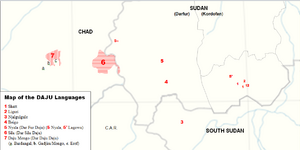Social:Daju languages
| Daju | |
|---|---|
| Dagu | |
| Ethnicity | Daju people |
| Geographic distribution | Sudan, Chad, South Sudan |
| Linguistic classification | Nilo-Saharan? |
| Proto-language | Proto-Daju |
| Subdivisions |
|
| Glottolog | daju1249[1] |
 | |
The Daju languages are spoken in isolated pockets by the Daju people across a wide area of Sudan and Chad. In Sudan, they are spoken in parts of the regions of Kordofan and Darfur, in Chad they are spoken in Wadai. The Daju languages belong to the Eastern Sudanic subfamily of Nilo-Saharan.[2]
Languages
The Daju languages are sub-classified as follows, following Stevenson (1956).
- Daju
- Eastern
- Shatt in the Shatt Hills southwest of Kadugli. (The name "Shatt" is also applied to other unrelated languages of the area.)
- Liguri (also known as Subori) in the Nuba Hills, Sudan
- Western
- Daju Mongo in Dar Daju, Chad
- Sila in Dar Sila, Chad
- Nyala around Nyala in Darfur, Sudan
- Beigo (extinct) in southern Darfur
- Njalgulgule in South Sudan on the Sopo River
- Eastern
Proto-Daju has been partially reconstructed by Robin Thelwall (1981). In his judgement, the Eastern Daju languages separated from the others perhaps as much as 2,000 years ago, while the Western Daju languages were spread more recently, perhaps by the Daju state which dominated Darfur from about 1200 AD until scattered after the death of Kasi Furogé, the Daju king, and replaced by the Tunjur. The principal phonetic difference between the two branches is the reflex of proto-Daju *ɣ, reflected as Western *r and Eastern *x.
Grammar
The typical verb root in Daju is a monosyllable of the form (C)VC(C). The perfective takes a prefixed k-; the imperfective, a prefixed a(n)-. The verb takes person suffixes, exemplified in Shatt (for the verb "drink" in the imperfective):
| singular | plural | |
|---|---|---|
| 1st person | a-wux-u I drink |
(w)a-wux-u-d-ök we drink |
| 2nd person | wux-u you drink |
wux-a-d-aŋ you (pl.) drink |
| 3rd person | mö-wux-u s/he drinks |
sö-wux-u they drink |
Suffixes on nouns serve to mark singulative (-tic, -təs), generic, and plural forms. The typical word order is subject–verb–object in most Daju languages, with exceptions such as Sila, and possessed–possessor.
See also
- List of Proto-Daju reconstructions (Wiktionary)
References
- ↑ Hammarström, Harald; Forkel, Robert; Haspelmath, Martin, eds (2017). "Dajuic". Glottolog 3.0. Jena, Germany: Max Planck Institute for the Science of Human History. http://glottolog.org/resource/languoid/id/daju1249.
- ↑ Ethnologue report for Nilo-Saharan, Eastern Sudanic, Western, Daju languages retrieved May 21, 2011
- R. C. Stevenson. "A survey of the phonetics and grammatical structure of the Nuba Mountains languages, with particular reference to Otoro, Katcha and Nyimang." Afrika und Übersee 40, 1956-7.
- Thelwall, Robin. 1981. "Lexicostatistical Subgrouping and Reconstruction of the Daju Group" in ed. Thilo C. Schadeberg & Lionel Bender, Nilo-Saharan: Proceedings of the First Nilo-Saharan Linguistics Colloquium, Leiden, September 8–10, 1980. Foris: Dordrecht.
- Thelwall, Robin. 1981. The Daju Language Group. Boston, Spa: British Library Document Supply Centre. Doctoral dissertation, Coleraine: New University of Ulster.
External links
- Nuba Languages and History, Robin Thelwall
- Language Map of Sudan Huffman, Steve
Template:Nilo-Saharan families
 |
